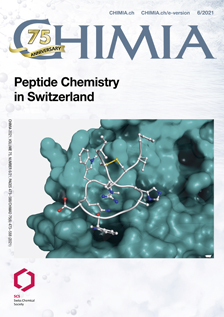Uncovering Novel Peptide Chemistry from Bacterial Natural Products
DOI:
https://doi.org/10.2533/chimia.2021.543PMID:
34233822Keywords:
Bacterial natural products, Biosynthetic gene clusters, Post-translational modifications, Proteusins, RippsAbstract
Nature has evolved a remarkable array of biosynthetic enzymes that install diverse chemistries into natural products (NPs), bestowing them with a range of important biological properties that are of considerable therapeutic value. This is epitomized by the ribosomally synthesized and post-translationally modified peptides (RiPPs), a class of peptide natural products that undergo extensive post-translational modifications to produce structurally diverse bioactive peptides. In this review, we provide an overview of our research into the proteusin RiPP family, describing characterized members and the maturation enzymes responsible for their unique chemical structures and biological activities. The diverse enzymology identified in the first two proteusin pathways highlights the enormous potential of the RiPP class for new lead structures and novel pharmacophore-installing maturases as biocatalytic tools for drug discovery efforts.Downloads
Published
2021-06-30
Issue
Section
Scientific Articles
License
Copyright (c) 2021 Florian Hubrich, Alessandro Lotti, Thomas A. Scott, Jörn Piel

This work is licensed under a Creative Commons Attribution 4.0 International License.
How to Cite
[1]
F. Hubrich, A. Lotti, T. A. Scott, J. Piel, Chimia 2021, 75, 543, DOI: 10.2533/chimia.2021.543.







